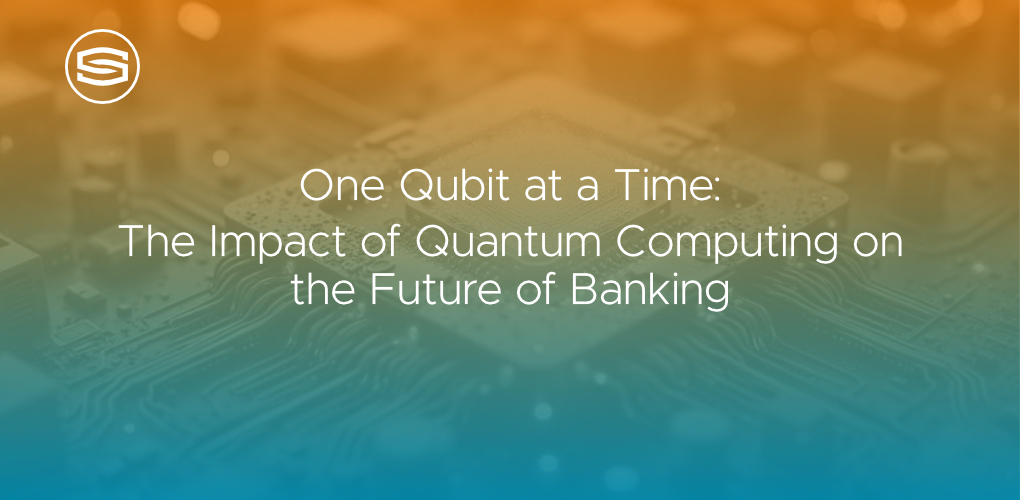
Insights & Opinions
One Qubit at a Time: The Impact of Quantum Computing on the Future of Banking
Mon, 14 Jul 2025


Quantum computing, once the realm of science fiction, is rapidly transitioning from theoretical possibility to technological reality. As banks and financial institutions grapple with seismic shifts driven by digital transformation, artificial intelligence, and cybersecurity demands, the quantum question looms larger: how soon will this next computational frontier impact the banking world, and are we ready for it?
Back in March 2022, the Cloud Security Alliance (CSA) began a countdown to April 14, 2030, which you can see on its website here. This is the date by which the CSA estimates that a quantum computer will be able to break present-day cybersecurity infrastructure.
At The Banking Scene Conference Brussels, a forward-looking panel moderated by Rik brought together two insightful voices: Hanna Engel, Azure Cloud Solution Specialist at Azelis, and Jan Sonck, Community Manager at Quantum Circle, to unpack the current state of quantum computing, its relevance for banking, and the strategic actions required to prepare for the inevitable.
The Current State of Quantum Computing
Quantum computing is not one single technology but a family of rapidly developing scientific domains. As Jan Sonck explained, quantum computing sits alongside other quantum technologies like quantum secure communication and quantum sensing. However, in banking, it is quantum computing, the use of quantum bits or "qubits" for vastly accelerated calculations, that draws the most attention.
Quantum computers differ fundamentally from classical ones. Traditional computers operate on binary bits (0 or 1), but quantum systems utilise qubits that can exist in multiple states simultaneously (a property called superposition). This enables them to solve certain complex problems significantly faster than even the most powerful supercomputers of today.
However, today's quantum hardware remains in a nascent stage. As Hanna and Jan highlighted, current quantum systems are limited in scale (often just a few thousand qubits), fragile, and expensive, ranging from €5 to €20 million for an IBM quantum system, depending on the configuration. Thus, practical deployment remains limited to cloud-based access provided by players such as IBM, Microsoft, and Google.
Misconceptions, Concerns and Banking-Specific Challenges
Banking professionals often view quantum with a mix of fascination and fear. One prevailing misconception is that quantum computing is simply an ultra-fast version of classical computing. As Hanna pointed out, it is not merely speed that matters: it is a fundamentally new way to approach computation, enabling powerful simulations and calculations that were previously impossible.
A major concern for banks lies in the regulatory and infrastructural complexity of adopting quantum solutions. As she acknowledged, deploying production-ready quantum applications in a highly regulated environment like banking remains a challenge. The industry is cautious by nature, and understandably so: security and trust are paramount.
Additionally, there is a general reluctance to engage deeply due to quantum's perceived complexity. As the panel noted, many stakeholders find the science intimidating and shy away from exploration. This barrier to entry is a significant issue that the quantum community is actively working to address.
The Symbiosis of AI and Quantum Computing
One of the most compelling arguments for investing in quantum research today lies in its intrinsic link with artificial intelligence (AI). Both AI and quantum computing thrive on data and computational intensity. Yet as classical computing begins to plateau in its ability to process complex AI models, quantum offers a new horizon.
As Hanna aptly described during the panel, machine learning is fundamentally about finding patterns in vast datasets using immense processing power. However, traditional computing architectures are struggling to keep pace with the demands of next-generation AI applications. Quantum computing, by leveraging principles like superposition and entanglement, has the potential to dramatically accelerate the training of AI models, reduce time to insight, and unlock richer outcomes from complex datasets.
This synergy is not merely theoretical. Quantum machine learning (QML) is already a research domain attracting intense focus from tech giants and academic institutions alike. By using quantum algorithms to optimise key AI functions such as clustering, classification, and regression analysis, researchers are demonstrating how even modest quantum resources can improve outcomes beyond what classical systems achieve today.
Jan noted that quantum and AI are not competing forces, but rather complementary systems: “Quantum does not function without AI,” he said, highlighting how the two will increasingly co-evolve
For banks already investing in AI, quantum computing represents the next logical step in performance optimisation. While quantum hardware remains nascent, AI teams can begin exploring quantum-inspired algorithms and hybrid approaches that combine classical and quantum techniques.
In this sense, investing in quantum is not just about future-proofing; it’s about enhancing today’s AI capabilities in anticipation of tomorrow’s demands.
Real-World Use Cases in Banking
Despite its infancy, quantum computing is already demonstrating potential in several banking-related applications:
- Portfolio Optimisation: Quantum algorithms can significantly improve the efficiency of modelling and optimising investment portfolios.
- Monte Carlo Simulations: Quantum computers excel at running large-scale simulations that are used in risk analysis, derivative pricing, and capital requirement estimations.
- Risk assessment and fraud detection: Faster and more precise identification of anomalies in transaction data.
- Customer personalisation: Real-time, data-rich analysis that improves segmentation and product recommendations.
- Trading strategies: Enhanced predictive analytics through hybrid AI-quantum models that evaluate complex market signals.
Major banks are already exploring these opportunities. HSBC has partnered with Quantinuum, while JPMorgan Chase and European institutions like BBVA and Crédit Agricole are also investing in quantum initiatives.
Yet, unlike industries such as energy, which openly share quantum findings to optimise shared systems, banking institutions tend to be secretive, focusing on proprietary use cases with competitive advantage. As Jan cautioned, this lack of collaboration may stifle broader innovation, especially in areas like fraud prevention and cybersecurity.
Post-Quantum Cryptography: A Strategic Imperative
Perhaps the most urgent quantum topic for banks is not computing itself but its implications for cryptography. The advent of powerful quantum computers threatens to break current encryption standards that underpin financial transactions, communications, and customer data protection.
One particularly pressing threat is the “Harvest Now, Decrypt Later” attack. Bad actors are already intercepting and storing encrypted data today, anticipating that in a few years, quantum machines will be capable of decrypting it. This creates an urgent need for banks to adopt Post-Quantum Cryptography (PQC) methods: algorithms resistant to quantum attacks.
Both Hanna and Jan emphasised that the time to act is now. The U.S. government, for example, has already passed legislation requiring vendors to be quantum safe by the end of this decade. Similar regulation is likely to emerge in Europe.
Implementing PQC is not about betting on an uncertain future; it is about securing systems against very real and evolving threats.
Becoming Quantum Safe: Steps for the Banking Industry
Rather than investing heavily and immediately in hardware or large quantum teams, banks should adopt a phased approach to becoming quantum safe:
1. Raise Awareness and Combat Fear
Educate staff, especially IT and risk departments, about what quantum computing is and is not. Overcoming the psychological barrier is the first step toward strategic engagement.
2. Start Exploring Now
Quantum vendors offer free or affordable cloud access to quantum environments. As Hanna highlighted, with just €500 in Azure credits, developers can begin testing quantum solutions in a sandbox environment.
3. Experiment with Use Cases
Begin with small-scale exploration of known algorithms for optimisation and simulation. Draw inspiration from other sectors and adapt them to banking contexts.
4. Invest in Post-Quantum Cryptography
Start integrating PQC into IT strategy. Assemble cross-functional teams to understand where and how cryptographic systems might need to be upgraded.
5. Collaborate Across Sectors
Join quantum communities and public–private collaborations. Share learnings, especially in non-competitive areas like risk mitigation and fraud detection.
Looking Ahead: From Hype to Strategic Advantage
While some remain sceptical about whether quantum will deliver on its promise, the panel agreed that even if the “quantum winter” returns, the industry will have gained valuable insights. As Jan noted, just learning to optimise classical AI through quantum thinking provides measurable benefits today.
The path forward does not require a leap of faith or massive investment. It requires thoughtful, incremental steps, building awareness, experimenting with applications, and preparing for post-quantum security.
In Hanna’s words, "Everything is a hype before it becomes a thing”.
Conclusion: One Qubit at a Time
Quantum computing presents both a formidable risk and a profound opportunity. It will not transform banking overnight, but neither will it wait indefinitely on the sidelines. Forward-thinking banks must treat this moment as the early phase of a technological marathon. Starting the race now, through education, small-scale testing, and cryptographic readiness, will ensure they are not left behind when the quantum leap finally arrives.
As the conference panel made clear, the future of banking may well depend on how wisely we act in the present!



